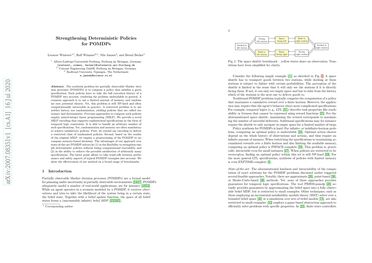Strengthening Deterministic Policies for POMDPs
The synthesis problem for partially observable Markov decision processes (POMDPs) is to compute a policy that satisfies a given specification. Such policies have to take the full execution history of a POMDP into account, rendering the problem undecidable in general. A common approach is to use a limited amount of memory and randomize over potential choices. Yet, this problem is still NP-hard and often computationally intractable in practice. A restricted problem is to use neither history nor randomization, yielding policies that are called stationary and deterministic. Previous approaches to compute such policies employ mixed-integer linear programming (MILP). We provide a novel MILP encoding that supports sophisticated specifications in the form of temporal logic constraints. It is able to handle an arbitrary number of such specifications. Yet, randomization and memory are often mandatory to achieve satisfactory policies. First, we extend our encoding to deliver a restricted class of randomized policies. Second, based on the results of the original MILP, we employ a preprocessing of the POMDP to encompass memory-based decisions. The advantages of our approach over state-of-the-art POMDP solvers lie (1) in the flexibility to strengthen simple deterministic policies without losing computational tractability and (2) in the ability to enforce the provable satisfaction of arbitrarily many specifications. The latter point allows taking trade-offs between performance and safety aspects of typical POMDP examples into account. We show the effectiveness of our method on a broad range of benchmarks.
PDF Abstract